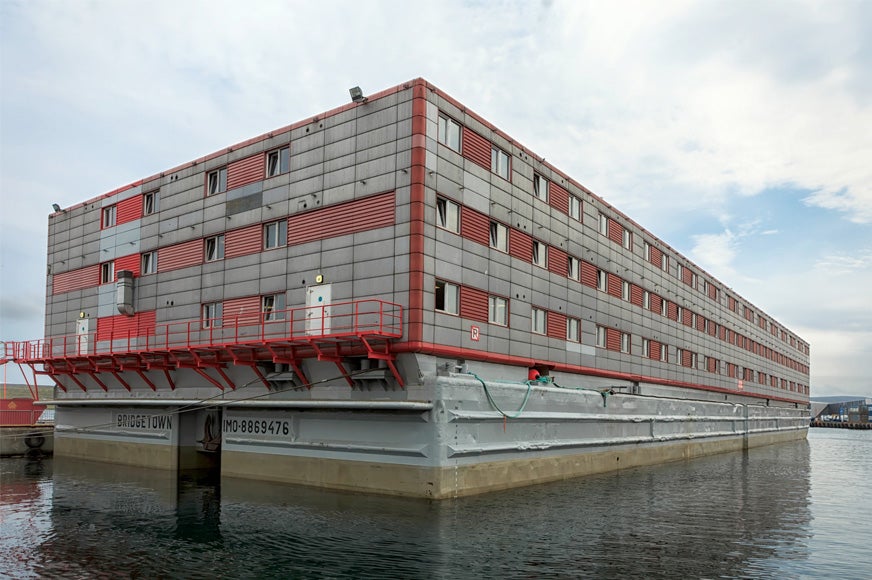
As the UK Home Office announces plans to lease an accommodation barge to house 500 asylum seekers off the Dorset coast, we look at a number ‘flotel’ leasing solutions being used across Europe to provide temporary accommodation to asylum seekers. Katherine Muir reports,
The UK Government recently announced plans to lease a giant barge to house around 500 asylum seekers off the Dorset coast.
The Bibby Stockholm barge has been leased for “at least 18 months”, according to a Home Office press release, from Liverpool-based Bibby Marine, which specialises in hiring vessels to transport and house off-shore workers, mainly for the energy sector.
Although the government has not released any costing information on the leasing deal, the Home Office has described it as “significantly cheaper than hotels”, which the government says is costing £6m a day. The Evening Standard has reported that “estimates have put the overall price tag of the charter and the berthing at more than £20,000 a day”, while the Daily Mirror estimates put it at between £8,000 and £15,000.
Floating hotel versus floating accommodation
In a statement to The Metro, Bibby Marine said: “Due to legal agreements, we cannot provide any details on individual charter agreements. Our floating accommodation barges offer a cost-effective solution for those in need of good quality accommodation. All have been refurbished to a high standard, catering to the safety and comfort of residents.”
The 222-bedroom Bibby Stockholm barge is to be moored at Portland Port in Dorset and provide accommodation for single male asylum seekers while their claims are being processed.
How well do you really know your competitors?
Access the most comprehensive Company Profiles on the market, powered by GlobalData. Save hours of research. Gain competitive edge.

Thank you!
Your download email will arrive shortly
Not ready to buy yet? Download a free sample
We are confident about the unique quality of our Company Profiles. However, we want you to make the most beneficial decision for your business, so we offer a free sample that you can download by submitting the below form
By GlobalDataThe vessel, which is currently moored in Genoa in Italy, is to be towed to the UK and will be operational “as soon as possible” according to Richard Holden, the parliamentary undersecretary for roads & transport, who told Kay Burley on Sky News that the first people could be on the barge within weeks.
Mr Holden also said that the Bibby Stockholm is just the first of several such barges, which the government plans to moor in major ports around the country, with the Daily Mail reporting that “there are plans in motion to hire a second barge able to hold four times as many people, likely to be moored in a major port town or city.”
Sky News reports that the number of migrants detected crossing the Channel in the week between 4 and 10 April was 1,106, more than double the capacity of the Bibby Stockholm barge.
The government is believed to be looking at further sites to lease to accommodate asylum seekers, such as ex-military bases.
The Netherlands flotel
The Bibby Stockholm was previously used to hire asylum seekers in the Netherlands in the 2000s but was taken out of service after a Dutch media investigation uncovered abuses taking place on board. It was later refurbished and was berthed off Lerwick in 2013 to house Petrofac workers building the Shetland Gas Plant.
The new plan has proved controversial, with objections coming from a range of different interest groups, including the local MP, Conservative Richard Drax, who is threatening legal action, the Tory-run Dorset Council, which has voiced concerns over suitability of the site, as well as rights groups such as Amnesty International and the Refugee Council, that oppose government plans to house asylum seekers on barges or other isolated accommodation.
Scotland flotel
The Scottish government has been using cruise ships as temporary accommodation to house Ukrainian refugees since July last year, leasing two 700-cabin ships to house up to 3,500 people, MS Victoria docked in the port of Leith in Edinburgh and MS Ambition docked on the River Clyde at Glasgow which arrived in September.
Scottish government figures estimate the total cost of MS Victoria until the contract ends in June this year as £37.9 million and for the six-month MS Ambition contract until February as £26.1 million.
The MS Ambition was leased from the British-based Ambassador Cruise Line, which started operating in April last year as a single-ship company. Ambition is its second ship. It had been planned to debut the ship in March this year, but the company postponed the launch of Ambition as a cruise liner after it agreed the deal with the Scottish government.
Ambassador said it was “adversely affected” by the war in Ukraine. The Travel Trade Gazette reports that an email sent by the company to customers stated: “When the opportunity to work with the Scottish government to support the Ukrainian population presented itself, we felt morally obliged to accommodate such a worthwhile cause and amend some of Ambition’s initial itineraries for 2023.” The ship is now due to launch from Newcastle as a holiday cruiser in May, visiting France and Spain on its maiden voyage.
Estonia flotel
MS Victoria berthed in Edinburgh is leased from the Estonian shipping company Tallink. The ship was most recently in service on the Tallinn-Stockholm route as a passenger ferry. Another of Tallink’s ships has been providing temporary accommodation for Ukrainian refugees in Estonia since April last year, and the ferry line has also leased two ships to the Netherlands to house asylum seekers from a number of different countries, among them Syria, Pakistan, Turkey, Eritrea and Chad.
Due to accusations that the asylum seekers would be living in luxurious conditions on board, the Dutch government has closed off the casino, the sauna and swimming pool, theatre and six out of seven of the ship’s restaurants. “We closed everything that shows any luxury to make sure that people in the Netherlands don’t consider it a cruise ship. It’s a ferry. There’s a big difference,” Hanneke Niele, who runs the operation for the state-run Central Agency for the Reception of Asylum Seekers, told The National.
According to the BBC, officials from the UK Home Office visited one of the Dutch ships in March to see for themselves how the scheme is operating there.
The BBC said the Dutch government refused to say how much were paying for the ship, which is thought to cost millions of euros a day. A spokesman for the Dutch government department running the refugee scheme stated: “It is indeed an expensive option. But it works. It works for the people, the residents on the ship, it works for the environment and it’s a shortcut solution for a serious problem.”







